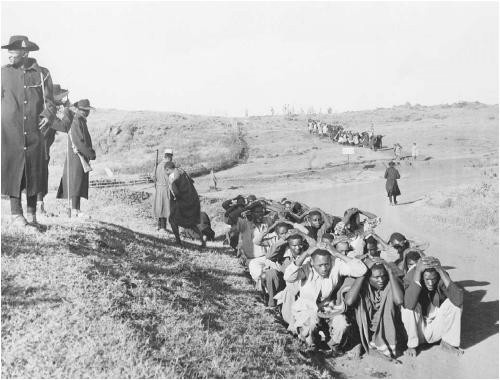Mau Mau Kenyans to Sue UK Government for Alleged Torture

Four Kenyans have been granted permission by the High Court to sue the British Foreign Office on charges that they were tortured by colonial officials during the 1950s and 1960s at the time of the Mau Mau rebellion.
High Court Judge Mr. Justice McCombe said: I have decided that the claimants have arguable cases, fit for trial. I emphasize that I have not found that there was systematic torture in the Kenyan camps nor that, if there was, the UK government is liable to detainees, such as the claimants, for what happened. I have simply decided that these .. claimants have arguable cases in law and on the facts as presently known.
The decision follows the revelation of about 17,000 previously unseen classified documents from the Foreign Office itself, which detailed atrocities committed upon Mau Maus in the years prior to Kenyan independence.
Thus, in a trial slated to take place in 2012, London will have to face accusations of torture, murder, sexual assault and other alleged abuses.
David Anderson, Professor of African at Oxford University who uncovered the documents told reporters: This really is a landmark case. Firstly, for the Kenyans themselves, it is seen as a major statement of principle. For many years in Kenya there has been a great resentment about Britain's failure to acknowledge what happened. Many in Kenya will be very relieved to have had this judgment.
Anderson added: It also has implications for Britain's imperial past. As a nation, we have been not very good at facing up to that history and I think this will help us do that and repair our reputation with our former colonies. As well as the claimants named in this case, there are others in Kenya who suffered a similar fate. My best guess is that there may be as many as 1,400.
The four Kenyan claimants -- Ndiku Mutwiwa Mutua, Paulo Muoka Nzili, Wambugu Wa Nyingi and Jane Muthoni Mara – are all at least 70 years old and say the documents prove that Britain approved and organized a systematic form of abuse on Kenyan rebels. (A fifth claimant has since died).
Among other atrocities, the High Court heard testimony that Mutua and Nzili were castrated, Nyingi was beaten unconscious and Mrs Mara was subjected to sexual abuse.
Martyn Day, solicitor for the Kenyan plaintiff, commented: Over 50 years ago our clients suffered the most terrible torture at the hands of the British Colonial regime. Castration, abuse, severe beatings, were just some of what they had to endure as the British tried to prevent the advance of the Kenyan Independence movement. Our clients have been battling for years to obtain justice for what they endured. Our government has seemed hell-bent on preventing that happening.
Day added: They want some sort of justice, an apology, some sort of money that would give them peace in their final years. They are not out to make themselves rich, they simply want a deal which allows them to get proper justice.
However, UK government ministers said the current government in Westminster is not culpable for actions committed more than a half-century ago.
Parliamentary Under Secretary of State at the Foreign and Commonwealth Office Henry Bellingham said: It is right that those who feel they have a case are free to take it to the courts. We understand the pain and grievance felt by those, on all sides, who were involved in the divisive and bloody events of the emergency period in Kenya.
Bellingham further stated: Despite today's judgment, the government will continue to defend fully these proceedings, given the length of time elapsed and the complex legal and constitutional questions the case raises. We have taken note of the judgment and are considering next steps.
The Mau Mau rebellion began in 1952 in opposition to white British rule in Kenya. By 1960, the colonial government had defeated the guerilla uprising, but not before 90,000 Kenyans were executed, tortured and maimed, according to The Kenya Human Rights Commission. Another 160,000 people were reportedly detained in horrific conditions.
Kenya gained independence from Britain in 1963.
© Copyright IBTimes 2025. All rights reserved.





















